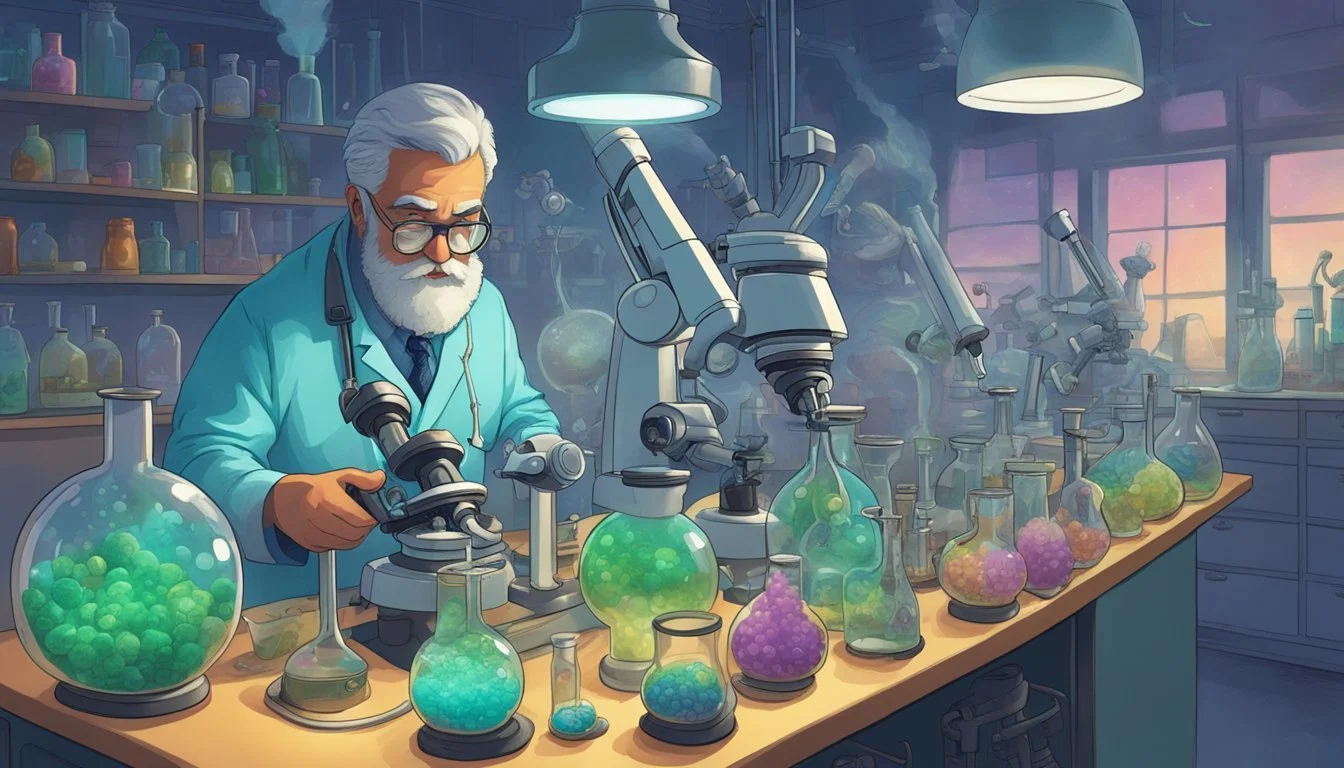10 Documentaries That Uncover the Weirdest Scientific Discoveries
Mind-Bending Revelations from the World of Research
Science documentaries offer viewers a captivating glimpse into the world of groundbreaking research and bizarre discoveries. These films blend education with entertainment, bringing complex scientific concepts to life through stunning visuals and expert insights. From the depths of the ocean to the far reaches of space, documentary filmmakers explore the frontiers of human knowledge.
The best science documentaries uncover weird and wonderful findings that challenge our understanding of the natural world. They showcase cutting-edge technologies, introduce viewers to eccentric researchers, and reveal unexpected connections between seemingly unrelated phenomena. By highlighting these strange and fascinating aspects of science, documentaries inspire curiosity and spark imagination in audiences of all ages.
1) 'The Man Who Knew Infinity' - The life of mathematician Srinivasa Ramanujan
'The Man Who Knew Infinity' is a captivating documentary that explores the extraordinary life of Srinivasa Ramanujan, an Indian mathematician who made groundbreaking contributions to the field.
Born in 1887 in Erode, India, Ramanujan possessed an innate genius for mathematics from a young age. Despite lacking formal training, he developed complex theories and formulas that continue to influence modern mathematics.
The documentary chronicles Ramanujan's journey from his humble beginnings in India to his collaboration with renowned mathematician G.H. Hardy at Trinity College, Cambridge. It highlights the challenges he faced as an outsider in the academic world and his unwavering dedication to his work.
Ramanujan's remarkable ability to intuitively understand complex mathematical concepts astounded his peers. His work in number theory, infinite series, and mathematical analysis laid the foundation for numerous advancements in the field.
The film sheds light on Ramanujan's untimely death at the age of 32, leaving behind a legacy of mathematical brilliance that continues to inspire researchers and mathematicians worldwide.
https://en.wikipedia.org/wiki/The_Man_Who_Knew_Infinity_(film)
2) 'Particle Fever' - The discovery of the Higgs boson particle
'Particle Fever' takes viewers on a thrilling journey into the world of particle physics. The documentary follows six brilliant scientists as they work on the Large Hadron Collider (LHC) at CERN.
The film captures the excitement and tension leading up to the LHC's first experiments. Viewers get an inside look at the massive underground tunnels where particles collide at nearly the speed of light.
'Particle Fever' skillfully explains complex scientific concepts to a general audience. It showcases the dedication and passion of the physicists involved in this groundbreaking project.
The documentary builds suspense as the scientists search for evidence of the elusive Higgs boson particle. This fundamental particle helps explain how matter obtains mass.
'Particle Fever' culminates with the historic announcement of the Higgs boson's discovery in 2012. The film captures the emotional reactions of the scientists as years of hard work pay off.
3) 'Three Identical Strangers' - The story of separated triplets
'Three Identical Strangers' tells the astonishing true story of Edward Galland, David Kellman, and Robert Shafran. These identical triplets were separated at birth and adopted by different families.
The brothers discovered each other by chance at age 19 in 1980. Their reunion captured public attention and led to media appearances showcasing their striking similarities.
As the documentary unfolds, it reveals a disturbing secret behind their separation. The triplets were part of a controversial scientific study on nature versus nurture.
The film combines archival footage, interviews, and reenactments to explore the brothers' experiences. It delves into the ethical questions surrounding the study and its impact on the triplets' lives.
Directed by Tim Wardle, the documentary premiered in 2018 to critical acclaim. It raises thought-provoking questions about scientific ethics and the bonds of family.
[https://en.wikipedia.org/wiki/Three_Identical_Strangers]
4) 'My Octopus Teacher' - The bond between man and octopus
'My Octopus Teacher' explores the unusual friendship between filmmaker Craig Foster and a wild octopus in a South African kelp forest. The documentary follows Foster's daily dives over the course of a year as he observes and interacts with the intelligent cephalopod.
The film showcases the octopus's remarkable abilities, including camouflage, tool use, and problem-solving skills. Viewers witness the creature's daily struggles for survival and its ingenious methods of evading predators.
Foster's persistent presence allows him to gain the octopus's trust, leading to touching moments of connection between two very different species. The documentary captures rare footage of octopus behavior, offering insights into the complexity of these often misunderstood animals.
'My Octopus Teacher' won the Academy Award for Best Documentary Feature in 2021. It highlights the therapeutic power of nature and the profound impact that interspecies relationships can have on human perspective and well-being.
[https://en.wikipedia.org/wiki/My_Octopus_Teacher]
5) 'Fantastic Fungi' - The hidden world of mushrooms
'Fantastic Fungi' takes viewers on a mesmerizing journey into the mysterious realm of fungi. Directed by Louie Schwartzberg, this 2019 documentary showcases the often-overlooked world of mushrooms and mycelium.
The film combines stunning time-lapse cinematography with CGI to bring the hidden life of fungi to the screen. It explores the biology, environmental roles, and various uses of these fascinating organisms.
Narrated by Brie Larson, 'Fantastic Fungi' features insights from experts in the field. Mycologist Paul Stamets and author Michael Pollan provide commentary on the importance of fungi in nature and human society.
The documentary highlights the surprising capabilities of mushrooms, from their role in ecosystem regeneration to potential medicinal applications. It presents fungi as crucial players in the health of our planet and its inhabitants.
'Fantastic Fungi' reveals the interconnected network of mycelium beneath the forest floor, demonstrating how these complex systems contribute to life on Earth. The film offers a new perspective on the often-overlooked kingdom of fungi.
6) 'Crip Camp' - The disability rights movement
'Crip Camp' is a groundbreaking documentary that sheds light on the origins of the disability rights movement in the United States. The film focuses on Camp Jened, a summer camp for disabled teenagers in the Catskills during the 1970s.
Camp Jened provided a unique environment where disabled youth could experience freedom and acceptance. This experience sparked a sense of empowerment among the campers, many of whom went on to become key figures in the disability rights movement.
The documentary follows the journey of these former campers as they fight for accessibility, equal rights, and the passage of the Americans with Disabilities Act. It showcases their protests, sit-ins, and tireless advocacy efforts.
'Crip Camp' not only educates viewers about an often-overlooked aspect of civil rights history but also highlights the ongoing struggle for disability rights. The film's powerful narrative demonstrates how a small group of determined individuals can create lasting social change.
https://en.wikipedia.org/wiki/Crip_Camp
7) 'The Barkley Marathons' - The world's most challenging race
'The Barkley Marathons: The Race That Eats Its Young' is a documentary that unveils one of the most grueling endurance races in the world. Set in the unforgiving terrain of Tennessee's Frozen Head State Park, this ultra-marathon pushes participants to their absolute limits.
The race consists of five 20-mile loops, totaling 100 miles, with a 60-hour time limit. Runners must navigate through dense forests, steep climbs, and treacherous descents, often in harsh weather conditions.
What makes the Barkley Marathons truly unique is its unconventional nature. The course changes annually, and runners must find hidden books along the way as proof of completion. The event's creator, Gary "Lazarus Lake" Cantrell, adds an element of mystery and humor to the proceedings.
The documentary captures the physical and mental challenges faced by participants, showcasing their determination and resilience. It offers viewers a glimpse into the world of extreme endurance sports and the human capacity to overcome seemingly impossible obstacles.
https://en.wikipedia.org/wiki/The_Barkley_Marathons:_The_Race_That_Eats_Its_Young
8) 'American Factory' - Cultural clash in an auto plant
'American Factory' documents the reopening of a shuttered General Motors plant in Ohio by Chinese company Fuyao Glass. The film captures the stark cultural differences between American and Chinese work practices.
Workers from both countries struggle to adapt to new expectations. Chinese managers push for long hours and increased productivity, while American employees resist changes to their work culture.
The documentary highlights tensions around safety standards, unionization efforts, and contrasting management styles. It provides an intimate look at globalization's impact on blue-collar workers in the U.S. Midwest.
Directors Julia Reichert and Steven Bognar spent three years filming over 1,200 hours of footage inside the factory. Their patience yields candid moments that reveal the human side of international business dealings.
'American Factory' offers a nuanced portrayal of the challenges faced when Eastern and Western work cultures collide in a globalized economy. It eschews simple narratives in favor of a complex, multifaceted exploration of modern manufacturing.
https://en.wikipedia.org/wiki/American_Factory
9) 'Apollo 11' - NASA's historic moon landing
'Apollo 11' is a 2019 documentary that offers a unique perspective on humanity's first steps on the Moon. Directed by Todd Douglas Miller, the film relies entirely on archival footage, including previously unreleased 70 mm film.
The documentary focuses on the 1969 Apollo 11 mission, which culminated in Neil Armstrong and Buzz Aldrin's historic lunar landing. It presents the events chronologically, from launch preparations to the astronauts' return to Earth.
Miller's film stands out for its lack of narration, interviews, or modern recreations. Instead, it allows the original footage and audio to tell the story of this monumental achievement in human history.
The film's meticulous reconstruction of events offers viewers an immersive experience. It provides a sense of being present during one of the most significant scientific and exploratory endeavors of the 20th century.
'Apollo 11' received critical acclaim for its innovative approach to documentary filmmaking and its ability to breathe new life into a well-known historical event.
https://en.wikipedia.org/wiki/Apollo_11_(2019_film)
10) 'Wild Wild Country' - The Rajneeshpuram cult
'Wild Wild Country' explores the controversial Rajneeshpuram community in 1980s Oregon. The Netflix documentary series chronicles the rise and fall of Indian guru Bhagwan Shree Rajneesh and his followers.
The series examines how Rajneesh's group established a commune in rural Wasco County, clashing with local residents. It delves into the cult's rapid expansion and increasing conflicts with authorities.
A key focus is Ma Anand Sheela, Rajneesh's personal assistant. The documentary details her role in managing the commune and her involvement in various criminal activities.
'Wild Wild Country' presents a complex narrative, featuring interviews with former cult members and local Oregonians. It explores themes of religious freedom, cultural clash, and the dark side of utopian ideals.
The series provides a balanced look at the events, allowing viewers to draw their own conclusions about this bizarre chapter in American history.
https://en.wikipedia.org/wiki/Wild_Wild_Country
The Nature of Scientific Discoveries
Scientific discoveries often emerge from unexpected places and challenge existing paradigms. The journey of uncovering new knowledge can be as fascinating as the discoveries themselves.
Defining Unconventional Research
Unconventional research pushes the boundaries of scientific inquiry. It often involves exploring ideas that seem counterintuitive or pursuing questions others have dismissed.
Scientists engaged in this type of work may face skepticism from peers. However, their willingness to think outside the box can lead to groundbreaking insights.
Some unconventional research methods include citizen science projects, interdisciplinary collaborations, and the application of cutting-edge technologies to traditional fields. These approaches can yield surprising results and open up new avenues of investigation.
Historical Context of Scientific Breakthroughs
Throughout history, many significant scientific discoveries were initially met with disbelief or ridicule. Galileo's heliocentrism and Darwin's theory of evolution faced strong opposition before gaining acceptance.
The 20th century saw a surge in unconventional discoveries. Einstein's theory of relativity revolutionized physics, while the discovery of DNA's structure transformed biology.
More recently, the detection of gravitational waves and the development of CRISPR gene-editing technology have reshaped our understanding of the universe and life itself.
These breakthroughs highlight the importance of supporting diverse research approaches. They demonstrate that today's fringe ideas may become tomorrow's scientific foundations.
Impact of Documentaries on Public Perception
Documentaries wield significant influence in shaping public understanding of scientific discoveries. They serve as powerful tools for education and advocacy, though their interpretations can sometimes lead to misunderstandings.
Educational Value and Misinterpretations
Documentaries like "An Inconvenient Truth" have brought complex scientific issues into the mainstream. This film sparked widespread discussions on climate change, moving it from the fringes to the forefront of public discourse.
However, documentaries can also lead to misinterpretations. Oversimplification of complex topics or selective presentation of facts may result in incomplete understanding among viewers.
Filmmakers face the challenge of balancing scientific accuracy with engaging storytelling. This delicate balance is crucial to avoid misleading audiences while maintaining their interest.
Role in Scientific Advocacy
Documentaries play a vital role in scientific advocacy. They can mobilize public support for research funding and policy changes.
"The Bleeding Edge" exposed issues with medical devices, leading to concrete actions. The film prompted regulatory scrutiny and influenced public perception of medical technology safety.
Documentaries like "Blackfish" have demonstrated the power to drive real-world change. This film altered public views on orca captivity, resulting in policy reforms and shifts in industry practices.
By presenting compelling visual evidence and personal stories, these films make abstract scientific concepts more relatable and urgent to the general public.
Ethical Considerations in Documentary Filmmaking
Documentary filmmakers face important ethical challenges when exploring scientific discoveries. They must balance accurate representation with engaging storytelling while upholding scientific integrity.
Balancing Accuracy and Sensationalism
Documentarians have a responsibility to present scientific findings truthfully. They should avoid exaggerating or misrepresenting discoveries for dramatic effect.
Filmmakers must carefully fact-check information and consult experts. Using clear visuals and analogies can make complex concepts accessible without sacrificing accuracy.
Sensationalizing results or cherry-picking data undermines scientific credibility. Documentaries should acknowledge uncertainties and limitations in research.
Respecting Scientific Ethics
Ethical documentaries honor the scientific process and protect research subjects. Filmmakers must obtain proper consent before filming experiments or interviewing scientists.
They should respect confidentiality agreements and intellectual property rights. Disclosing sensitive information prematurely could jeopardize ongoing studies.
Documentarians should also consider the broader impacts of their work. Misrepresenting controversial research could fuel public misconceptions or hinder scientific progress.
Collaborating closely with scientists helps ensure ethical portrayal of their work. Allowing researchers to review relevant footage can catch inaccuracies.




